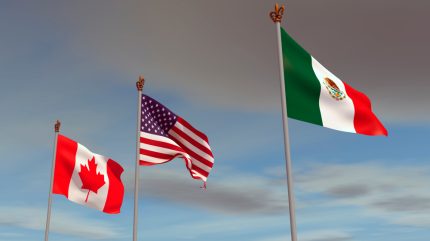
Four Commissioners from the bipartisan and bicameral Congressional-Executive Commission on China (CECC) recently wrote to the trade representatives of the US, Canada, and Mexico, calling for the “robust implementation” of existing forced labour import bans under the United States-Mexico-Canada Agreement (USMCA).
The CECC also urged for “greater cooperation” to prevent goods rejected by one country from being re-exported to another within the agreement’s framework.
The commission emphasised the need for USMCA partners to take “additional steps” and build on the progress made to effectively stop the import of goods produced with forced labour into North America.
While progress has been made, the CECC argued that more enforcement is necessary. It pointed to the Uyghur Forced Labor Prevention Act (UFLPA) as a critical enforcement mechanism, developed to ensure US agencies comply with laws prohibiting the import of goods made with forced labour.
The CECC hopes UFLPA can serve as a model for similar legislation in Canada and Mexico, creating a forced labour-free zone across North America.
The letter read: “We welcome the forced labour section of the USMCA and are pleased that each of the parties has acted to bring their laws into compliance with the agreement. We are also pleased that a trilateral dialogue on forced labour has been established, as well as an agreement to share information about shipments denied at US ports under the UFLPA import ban.

US Tariffs are shifting - will you react or anticipate?
Don’t let policy changes catch you off guard. Stay proactive with real-time data and expert analysis.
By GlobalData“Central to this goal is the UFLPA’s “rebuttable presumption,” which places the burden on importers to prove that their supply chains do not include goods produced or mined, wholly or in part, in the XUAR or through a state-imposed labour transfer program. We believe this approach is the most effective way to ensure that our countries are in full compliance with our obligations under Article 23.6 with regard to the PRC.”
The CECC highlighted that the list identified by the US Customs and Border Protection (CBP) named cotton as one of the priority sectors for enforcement, and stressed the need for cooperation, as many detained goods originate from Southeast Asia rather than directly from the People’s Republic of China (PRC).
It urged the utilising of existing information-sharing agreements to stop the transfer of forced labour products as well as identified re-export or transhipment schemes.
Joint action, the CECC argued, would enable customs administrations across the USMCA region to “quickly identify” forced labour imports and take “appropriate enforcement action” based on standardised information.
The CECC also encouraged the parties to consider the upcoming joint review in July 2026 as an “opportunity to codify the suggestions shared.”
In conclusion, the CECC stated: “Making North America a forced labour import-free zone is a goal that would bring credit to each of our countries and benefit all our citizens.”
In 2021, USMCA was identified as an opportunity to focus on combating forced labour and tackling environmental issues, the first-ever USMCA Free Trade Commission Meeting heard.



